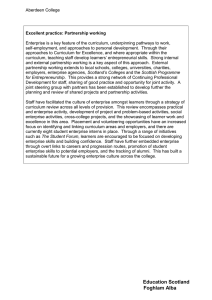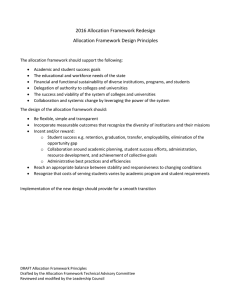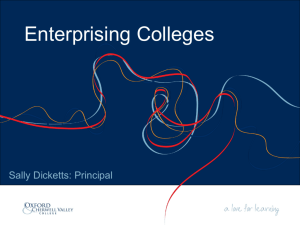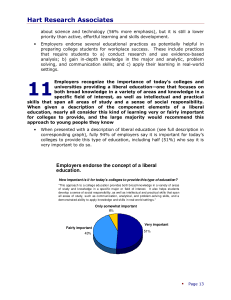The role of essential skills in Scottish national education policy
advertisement
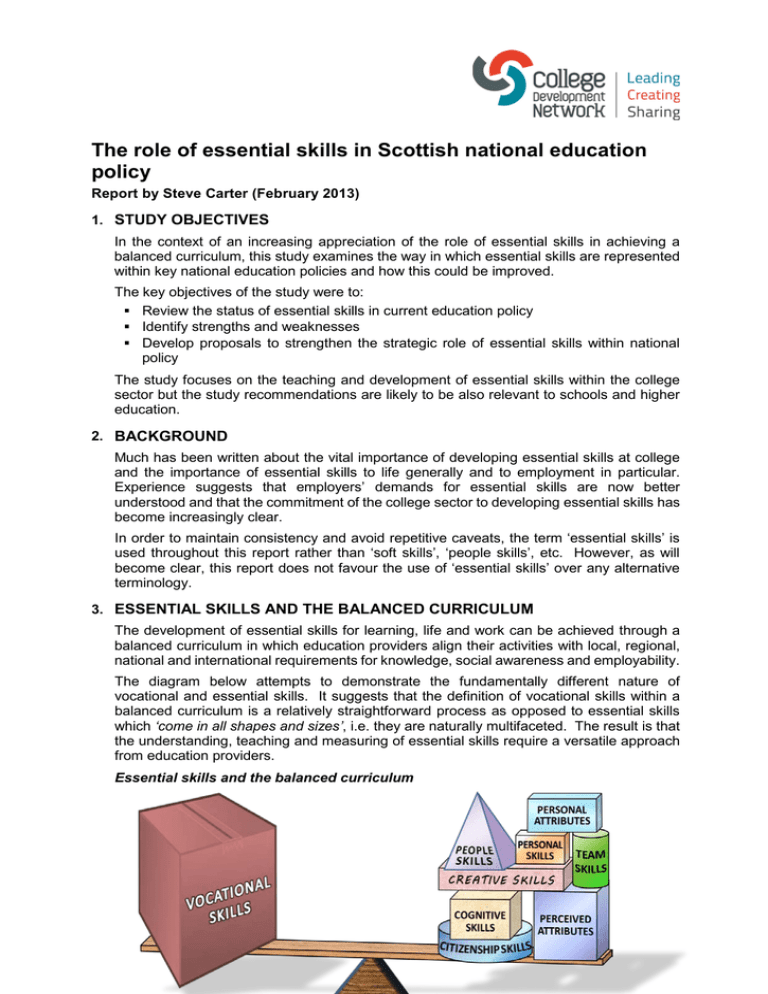
The role of essential skills in Scottish national education policy Report by Steve Carter (February 2013) 1. STUDY OBJECTIVES In the context of an increasing appreciation of the role of essential skills in achieving a balanced curriculum, this study examines the way in which essential skills are represented within key national education policies and how this could be improved. The key objectives of the study were to: Review the status of essential skills in current education policy Identify strengths and weaknesses Develop proposals to strengthen the strategic role of essential skills within national policy The study focuses on the teaching and development of essential skills within the college sector but the study recommendations are likely to be also relevant to schools and higher education. 2. BACKGROUND Much has been written about the vital importance of developing essential skills at college and the importance of essential skills to life generally and to employment in particular. Experience suggests that employers’ demands for essential skills are now better understood and that the commitment of the college sector to developing essential skills has become increasingly clear. In order to maintain consistency and avoid repetitive caveats, the term ‘essential skills’ is used throughout this report rather than ‘soft skills’, ‘people skills’, etc. However, as will become clear, this report does not favour the use of ‘essential skills’ over any alternative terminology. 3. ESSENTIAL SKILLS AND THE BALANCED CURRICULUM The development of essential skills for learning, life and work can be achieved through a balanced curriculum in which education providers align their activities with local, regional, national and international requirements for knowledge, social awareness and employability. The diagram below attempts to demonstrate the fundamentally different nature of vocational and essential skills. It suggests that the definition of vocational skills within a balanced curriculum is a relatively straightforward process as opposed to essential skills which ‘come in all shapes and sizes’, i.e. they are naturally multifaceted. The result is that the understanding, teaching and measuring of essential skills require a versatile approach from education providers. Essential skills and the balanced curriculum Page 1 of 16 4. POLICY REVIEW A sample of seven current education policies was reviewed in order to identify the strategic role of essential skills within key policies. The full review is provided in Appendix A. Analysis of the seven policies demonstrates that essential skills have a regular profile in national education policy and so there is no evidence that essential skills lack strategic recognition. However, there is a lack of consistency in the way that essential skills are represented within the policy documents. Names for ‘essential skills’ Within the seven policy documents selected for analysis in Appendix A, the following twelve terms are used more or less interchangeably to describe ‘essential skills’: • • • • Essential skills Transferable skills Soft/softer skills Personal skills • • • • Generic skills Core skills Life skills Employability skills • • • • Basic skills ‘Fuzzy’ skills Interpersonal skills People skills This is by no means a complete list of terms used to describe essential skills as many other names are used in this connection, ranging from ‘enabling skills’ to ‘socio-emotional competencies’. Character of essential skills A large number of individual essential skills are mentioned in the seven policy documents analysed in Appendix A including thirty-five individual essential skills within the brief (half page) summaries of Curriculum for Excellence and Skills for Scotland alone. A quick search for ‘essential skills’ on the internet yields many more results and, in order to demonstrate the point, a non-exhaustive list of one hundred different essential skills is provided in Appendix B. 5. INTERVIEWS Interviews were carried out with three members of college staff who have a particular interest in the subject of essential skills: Kevin Murphy –Chair of the Essential Skills Advisory Group for Scottish colleges and Director of Learning & Teaching, Angus College Grant Ritchie – Depute Principal, Dundee College Mina Welsh – Project Leader of the MASS (Measuring & Assessing Soft Skills) project Interviews were also organised with two employers in order to obtain their views on the role of essential skills Maureen Douglas – HR Manager, Forster Group (Specialist Scottish roofing contractor) Marcus Kenyon - Hotel Operations Manager, Crieff Hydro In addition, the subject of essential skills was discussed at two meetings/events: The Festival of Dangerous Ideas (13 June 2012) – a session on essential skills was run, attended by around 45 members of staff from various Scottish colleges Essential Skills Advisory Group (24 October 2012) - attended by 18 members of staff from various Scottish colleges Summaries of the above interviews and events are provided in Appendix C. Page 2 of 16 CONCLUSIONS AND RECOMMENDATIONS Conclusions Following careful consideration of the opportunities and barriers affecting essential skills, two main conclusions have been identified: There are too many different names for ‘essential skills’ and this acts as a barrier to: (a) understanding and working with essential skills (b) achieving the best possible representation of essential skills in national education policy There is a lack of a common, underlying structure to support and optimise the use of essential skills in national education policy and in education generally Further conclusions arising from the research and interviews carried out as part of this study are: It is recognised that essential skills have become at least as important as technical skills to employers There remains a need to continue to raise the profile and improve understanding of the nature and role of essential skills The effective tuition of essential skills is best achieved through a customised approach for each student The acquisition of essential skills can be achieved through all aspects of life and so reflection by students is a key element in the development, recognition and application of essential skills It is recognised that success in learning technical skills can also help to support the development of essential skills Work placements and volunteering can provide effective support to the learning and utilisation of essential skills No simple, universal method for the tuition of essential skills exists, therefore the sharing of good practice is a valuable exercise The development of essential skills could be improved through improved liaison between schools, colleges and employers Schools and universities have an important role in the teaching of essential skills The core values of an organisation can provide a helpful framework for the development of essential skills Measurement of essential skills is specific to each student and the process does not accommodate comparison between students or colleges The teaching and learning of essential skills is a complex subject that cannot be driven by Government targets The employability of students in certain sectors, e.g. tourism, could be improved by stronger links between colleges and employers Adults can often benefit from improved essential skills as well as young people The teaching of essential skills should be every teachers’ job Page 3 of 16 Recommendations The two key recommendations from this study are: 1) Leadership should be provided by the college sector to secure agreement for a single, unifying name for ‘essential skills’ - The single, unifying name should be self-explanatory and fit for purpose - An action plan should be developed to achieve widespread adoption of the selected name by all policy makers, employers, practitioners and students The name should be developed in consultation with policy makers, employers, practitioners and students NB It is important that the selection of a single, unifying name for ‘essential skills’ is made through a collaborative process and therefore no preference for any particular name is indicated or implied in this report 2) The college sector should discuss, agree and adopt a common segmentation framework for all aspects of working with essential skills - The framework should divide essential skills into intuitive, logical groups The number of groups of skills within the framework should be manageably small but sufficient to achieve clear differentiation between groups - The framework should be self-explanatory and easily communicated to potential users - The college sector should secure adoption of the common segmentation framework by all policy makers, employers, practitioners and students In order to stimulate discussion, a proposed segmentation framework is provided on the following page, based on the following eight categories: Basic skills such as personal appearance, good manners and time-keeping Personal skills such as self-motivation, reliability and determination People skills such as building relationships, communication and negotiation Team skills such as helping others, mentoring & coaching and delegating Cognitive skills such as critical thinking, problem solving and interpretation Creative skills such as innovation, imagination and visioning Citizenship skills such as global & cultural awareness and community spirit Observed skills such as professionalism, demeanour and integrity The proposed essential skills segmentation framework has the capacity to be used in a number of positive ways, for example: • • • • • To promote improved understanding of the nature and range of essential skills among students, staff, employers and policy makers To assist the planning and prioritising of essential skills tuition within the curriculum To improve the assessment of student needs and the customisation of essential skills for individual students To support the teaching and learning of essential skills generally To enhance the role of essential skills within national education policy Page 4 of 16 Proposed essential skills segmentation framework PROPOSED SEGMENTATION FRAMEWORK FOR ESSENTIAL SKILLS NB The skills listed above are not intended to be exhaustive for each category Page 5 of 16 APPENDIX A Essential skills – a sample of key policies and initiatives The following sample of national policies and initiatives highlights the need for an enhanced curriculum that recognises and promotes the development of essential skills as an essential component of education in Scotland. Curriculum for Excellence http://www.educationscotland.gov.uk/thecurriculum/whatiscurriculumforexcellence/index.asp Curriculum for Excellence encourages a coherent, flexible and enriched curriculum from age 3 to 18. The curriculum aims to help every learner develop knowledge, skills and attributes for learning, life and work which are encapsulated in the four capacities set out below, each defined by its associated skills: Successful learners – enthusiasm & motivation for learning; determination to reach high standards; openness to new thinking; use of technology; creative thinking; independent & group learning; reasoned evaluations; flexible approach to learning. Confident individuals – self-respect; physical, mental & emotional wellbeing; secure values & beliefs; self-awareness; developing & communicating a world view; independent living; risk assessment & informed decision-making; achieving success in different activities. Responsible citizens – respect for others; responsible participation in political, economic, social & cultural life; knowledge & understanding of the world; understanding different beliefs & cultures; evaluating environmental, scientific & technological issues; developing informed, ethical views of complex issues. Effective contributors – enterprising attitude; resilience; self-reliance; communication; team working; initiative & leadership; critical thinking; creativity; problem-solving. Skills for Scotland – a lifelong skills strategy http://www.scotland.gov.uk/Publications/2007/09/06091114/0 Scotland's Skills Strategy is the framework that underpins all policy for working with individuals, communities, institutions and employers to help create both a skilled population and an economy and society that make full and productive use of these skills. The Strategy aims to provide clarity and simplicity in skills provision in Scotland by bringing focus to the range of public agencies involved in skills and lifelong learning development and highlights a number of overlapping clusters of skills Transferable skills: • • • • • • personal and learning skills that enable individuals to become effective lifelong learners literacy and numeracy the five core skills of communication, numeracy, problem solving, information technology and working with others employability skills that prepare individuals for employment rather than for a specific occupation essential skills that include all of those above vocational skills that are specific to a particular occupation or sector Page 6 of 16 Appendix A (continued) More Choices, More Chances http://www.scotland.gov.uk/Resource/Doc/129456/0030812.pdf More Choices, More Chances (MCMC) provides a strategy to reduce the proportion of young people not in education, employment or training (NEET) in Scotland. This problem affects around 35,000 young people (13.5%) between the ages of 16 and 19. The MCMC strategy includes a number of actions relating to the development of an enhanced curriculum, e.g. • Recognition of wider achievement - giving credit to different skills, abilities and achievements • Developing employability - to better prepare all young people for the world of work • Supported transitions and sustained opportunities - expanding choice and building the quality of education and learning options for young people to improve long-term employability • Building the skills and employability focus of a range of providers who deal with young people who are, or are at risk of becoming, NEET Learning to Work – enhancing employability and enterprise in Scottish education http://www.gla.ac.uk/media/media_76842_en.pdf A key purpose of education is to improve the life chances of learners by developing their knowledge, skills and attitudes. Learners’ life chances depend greatly on how well they are equipped for the world of work. More than ever before, people will have to manage their own career development and be prepared to keep on learning if they are to be effective in their chosen occupations. Scotland’s success depends on flexibility, capability and creativity in the workforce. Lifelong learning has a pivotal role to play in meeting the needs of individuals as they progress through their careers and, in doing so, in meeting the needs of society and the economy. Employability is about an individual’s chances of progressing into and through the labour market successfully, according to what they choose to do. A person’s employability at any one time depends on a combination of their own skills, understandings and attributes and external factors and circumstances. Citizenship in Scotland’s Colleges http://www.educationscotland.gov.uk/inspectionandreview/Images/cisc_tcm4-712693.pdf Citizenship involves the development of skills and attributes to enable young people to participate in the making of decisions, within the political, economic, social and cultural contexts of their lives. Other aspects of citizenship education include the development of knowledge and understanding; a focus on values and citizenship issues; and opportunities for engagement in, and reflection on citizenship activities. • Volunteering within college and in communities • Participating in Student Associations • Class Rep System • Fundraising • Charity Events • Sustainability and Recycling Projects Page 7 of 16 Appendix A (continued) Learning by Volunteering http://www.scotlandscolleges.ac.uk/curriculum/communities-of-interest/learning-byvolunteering-website.html The Learning by Volunteering initiative aims to: • • • • • Recognise volunteering as a national strategic priority and a key component of Curriculum for Excellence Promote volunteering at all Scottish colleges and establish effective local volunteering partnerships Coordinate volunteering effectively at national level Achieve formal recognition of volunteering achievements Embed a culture of volunteering in every college Motivated College http://www.scotlandscolleges.ac.uk/curriculum/the-motivated-college/the-motivatedcollege.html This programme of professional development is designed to enhance reflective practices and create positive, motivating learning environments for both students and teachers. • • • • • • Increased self-awareness Development of emotional intelligence Positive attitude to achievement and growth mindsets Developing resilience Collaborative learning Taking responsibility for own learning Page 8 of 16 APPENDIX B A non-exhaustive list of 100 essential skills Accountability Adaptability Analytical Assertiveness Body language Building relationships Business awareness Character Coaching Commitment to learning Common sense Communication Community spirit Completing the job Composure Conducting meetings Confident Conflict management Conscientious Consensus building Conviction Co-operation Counselling Courtesy Creativity Critical thinking Cultural awareness Dealing with ambiguity Decision making Delegating Demeanour Dependability Determined Diligence Empathy Personal appearance Enterprising Personal energy Enthusiasm Planning Environmental awareness Political awareness Etiquette Positive attitude Flexibility Presentation skills Following instructions Problem solving General knowledge Professionalism Global awareness Punctuality Goal setting Reasoning Good attendance Reliability Good manners Resilience Helpful Resourceful Honesty Respectful Imaginative Responsible Influencing Result oriented Innovation Risk management Inspiring Safety conscious Integrity Self-awareness Interpretive Self-directed Introspective Self-esteem Leadership Self-motivated Listening Strategic thinking Management Stress management Mentoring Supportive Moral Task management Negotiating Team building Observation Team learning Openness Organising Passion Patient Perceptive Time management Trustworthiness Visionary Well-being Work ethic Page 9 of 16 APPENDIX C Interview notes Kevin Murphy – Chair of the Essential Skills Advisory Group for Scottish colleges • • • • • • • • • • • • • • • • • • Essential skills terminology is a barrier to understanding and working with essential skills Essential skills need to be simplified in order to improve their fit with the Scottish Government’s education policy Essential skills are important to the development of ‘hard’ (technical/vocational) skills Success in learning technical skills can also help to support the development of essential skills, e.g. giving a presentation can be challenging but helps to build confidence An attempt was made to fully integrate the teaching of essential skills with course technical skills but students seemed to prefer separate sessions for essential skills A test of certain core skills (numeracy, communication, IT) is carried out with students at interview/induction and the results are used as a tool to place students on a programme that is customised to their needs HMI recently visited to assess Angus College’s teaching of essential skills and their report confirms that the college maximises opportunities to address this subject The Essential Skills Advisory Group meetings offer an opportunity to share good practice from different colleges and the group has an external speaker at each meeting The Advisory Group aims to capture an understanding of the role of essential skills from the students’ perspective The Advisory Group hopes to develop an app that would help students to measure their progress in individual essential skills - they currently use their e-portfolio for this The Advisory Group would like to develop a computer game based on each of the eight topics within the essential skills programme Refection is a key element in the development of essential skills Some adults also need to improve their essential skills but adults may be less aware and/or willing to address this subject CVs are not often designed to demonstrate ability in essential skills but interviews are often more about essential skills than technical skills Staff appraisals within organisations do not always consider employees’ essential skills Primary schools are considered to be good at teaching essential skills Secondary schools often have insufficient knowledge of essential skills and don’t always give them sufficient priority in class (Curriculum for Excellence may help to address this over time) Universities do not appear to give priority to the teaching of essential skills Grant Ritchie – Depute Principal, Dundee College • • • • Student volunteering is encouraged to support transitions to Higher Education ‘Core skills’ profiles are developed for students as an exercise within their classes, not as a separate exercise Dundee College has many examples of good practice in the teaching of essential skills Despite reductions in teaching hours, pastoral care and tutorial support are still given priority Page 10 of 16 Appendix C (continued) Grant Ritchie – Depute Principal, Dundee College (continued) • • • • • • • • • • Dundee College places a strong emphasis on providing essential skills to young people needing special support Transition workers and support workers are used to provide employability support for students generally, not just those with special needs Employers want young people with good essential/employability skills and Dundee College meetings with employers always include discussion about essential skills Futureskills report in 2002 was one of the first to state the importance of essential skills to employers There is a need to find the right balance between technical and essential skills within courses - subject specialists tend to pack their programmes with technical content but are encouraged to include an appropriate proportion of essential skills Not all lecturers have the skills to provide effective tuition in essential skills within technical courses and this suggests a staff development opportunity Schools do not sufficiently address essential skills It is a challenge to clearly explain and define essential skills Tuition in essential skills should be customised to future employment requirements – overall students in people facing subjects should have broader tuition in essential skills than students doing non people facing subjects Although the importance of essential skills is becoming better recognised there is still a need to raise the profile and improve understanding of essential skills Mina Welsh – Project Leader of the MASS (Measuring & Assessing Soft Skills) project • • • • • • • • The recently completed MASS (Measuring & Assessing Soft Skills) project aimed to improve the acquisition and development of soft skills by piloting new learning materials that raise awareness of what soft skills are, help learners to assess themselves and identify where and how learners can actively improve soft skills within the context of their learning programmes It is hoped that a second phase of the MASS project will secure funding to help bring young people closer to the labour market (nessie - Network for Soft Skills Innovation for Employment) It was noted that the MASS project approach was also used successfully with adults The essential skills within the MASS tree logo (right) were chosen by students Employers want people with the correct soft skills such as a positive attitude and motivation – the second phase of MASS will explore the employers’ perspective across three countries Assessment of soft skills is carried out by the course tutor with individual students, based on positive behaviour not discipline A customised, supportive approach is taken with each student and positive feedback has been received from parents for this approach Tutors build confidence of students within a safe environment (e.g. Skillzone) and trust and respect are key Page 11 of 16 Appendix C (continued) Mina Welsh – Project Leader of the MASS project (continued) • • • • Autonomous v Intermixed: opportunities are taken to address soft skills during all lessons but a dedicated soft skills period takes place, typically in small groups Psychometric testing is used sparingly to assess soft skills Measurement of soft skills must be a personal journey specific to each student – the process does not allow comparison between students or colleges Need to embrace ‘shades of grey’ when dealing with soft skills – not a black and white subject that can be driven by Government targets Maureen Douglas – HR Manager, Forster Group Forster is one of the largest family-owned roofing contractors in Scotland. As a specialist in roofing for over 22 years it has established an outstanding reputation within the construction industry. Forster is responsible for roofing almost one in five of all new homes built across Scotland every year, working closely with the major house builders to construct homes of distinction. • • • Attitude and behaviour is a key aspect of skills requirements at the company – technical skills are less important Soft/essential skills have a bigger impact on the success of the company than qualifications The company places great importance on its core values below: - Our culture encourages open and honest communication. - We carry out our business with respect, integrity, honesty and fairness towards • • • • • • • • others. - We are passionate about what we do and ambitious about what, together, we can achieve. - We believe in loyalty and in the importance of being decisive. - We make every effort to keep all our stakeholders informed and have a shared aspiration to develop and grow together. The above values have been adopted for sound business reasons, not just altruism The above values apply to all staff and are used throughout the company’s business, e.g. recruitment where interviewees are expected to be polite, passionate, etc. The company strives for excellence and understands that the difference between excellence and ordinary is attitude The greatest need is for behavioural training including safety where the company, over two years, moved from a compliance approach to a competence approach (no blame culture) The company feels that there is a missing link in terms of engagement between schools, employers and colleges The company provides support with the preparation of CVs at school and aims to educate teachers in the requirements of employers The company is keen to assist ‘under achievers’ and has been successful in transforming the fortunes of such individuals Young people are more accommodating of change, including essential skills, and understand that there is no longer an expectation of a job for life Page 12 of 16 • • • • • • • Staff were lost in 2007 at the peak of the construction sector and, since then, attention has been given to ensuring a modern skillset including IT literacy The company has a training centre in Brechin to train its 100+ employees Since 2006 the company has worked closely with schools and colleges and, as an employer, feels a responsibility to provide employment opportunities to the people of Angus The company has a good relationship with Brechin High School, providing opportunities for trainees who are hired for their attitude rather than their academic achievements – training in technical construction skills is provided by the company Young people’s experiences at school are an important factor in recruitment, e.g. extracurricular activities such as the Prince’s Trust, positions of responsibility, etc. Volunteering is seen as an effective way to improve essential skills and acts as a reminder of what life is really like The priority for schools is academic attainment so non-academic young people are not well provided for Marcus Kenyon - Hotel Operations Manager, Crieff Hydro Marcus Kenyon is a member of the Perthshire Tourism Partnership and is a former Chairman of the Angus & Dundee Area Tourism Partnership. • • • • • • • • • • • • • • • Colleges do not consistently produce people that hotels need - this is hindering the ability of hospitality students to get jobs in the tourism sector Colleges do not always keep up with industry trends and can be slow to engage with tourism and hospitality businesses Colleges have shown inflexibility in terms of working outwith normal curriculum hours It is also recognised that hotels don’t do enough to work with colleges Students are often poorly prepared for interview for hospitality jobs and should get support with CVs, interview preparation, personal presentation skills, etc. Newly qualified students often lack the necessary essential skills for hotel work, e.g. confidence, conversational skills, social skills, honesty, reliability, positivity and selfmotivation Despite the above comments, there is no such thing as a lost cause in terms of an employee Need to start essential skills training at primary school – secondary school is too late as attitudes have become entrenched Hotels are keen to engage with schools to improve awareness of careers in tourism but have experienced some difficulty fitting in with the school curriculum Essential skills for tourism can be translated into other employment sectors Work placements have been provided by hotels and this has produced successful results, for example in terms of improved confidence and readiness for employment Young people need to develop a practical approach to the needs of an employer The V&A at Dundee and Malmaison offer great opportunities of which colleges should be preparing to take advantage College lecturers with hospitality industry experience are better placed to instil the relevant essential skills among students and to act as role models Volunteering can be a good way to learn essential skills Page 13 of 16 • The teaching of essential skills should be every teachers’ job Page 14 of 16 Appendix C (continued) Essential Skills Advisory Group (24 October 2012) • • • • • • • • The definition of essential skills is muddled, partly due to the multiplicity of different names Policy makers are confusing the issue – we need one name and one definition of essential skills – however, it is recognised that this will not be easy to achieve Colleges appear to have many different ways of defining and teaching essential skills Preferred alternative names for ‘essential skills’ were ‘enabling skills’ and ‘transferable skills’ It was noted that there may be a need to find a different way to define essential skills It was noted that any name and definition of essential skills must demonstrate a good fit with Curriculum for Excellence Any initiative to redefine or rationalise essential skills should be done in liaison with employers, practitioners, policy makers and students Reflective practice is an important element in acquiring essential skills The Festival of Dangerous Ideas (13 June 2012) A presentation on the draft recommendations of this study was given at the Festival of Dangerous Ideas at Scotland’s Colleges, Stirling on 13 June 2012. As part of the session the 27 college practitioners in attendance took part in an exercise to identify their preferred name for 'essential skills'. Each person indicated a first, second and third choice and scores of 3, 2 and 1 were allocated respectively. The table below shows the top 11 names selected. Please note that this exercise was intended simply to ‘test the water’ and does not reflect any broader view on the subject. Festival of Dangerous Ideas - 13th June 2012 PREFERRED NAMES FOR 'ESSENTIAL SKILLS' 0 2 4 Skills for learning, life and work Life skills Essential skills Skills for life and work Personal skills Social skills Lifelong learning skills Core skills Employability skills Interpersonal skills People skills Page 15 of 16 6 8 10 12 14 16 18 20 22 ACKNOWLEDGEMENTS Many thanks to the following people who made valuable contributions to this study: Kevin Murphy – Chair of the Essential Skills Advisory Group for Scottish colleges Grant Ritchie – Depute Principal, Dundee College Mina Welsh – Project Leader of the MASS (Measuring & Assessing Soft Skills) project Maureen Douglas – HR Manager, Forster Group Marcus Kenyon – Hotel Operations Manager, Crieff Hydro Attendees at the Festival of Dangerous Ideas session on 13 June 2012 Members of the Essential Skills Advisory Group at the meeting on 24 October 2012 The author of this report would also wish to acknowledge the ‘Teaching and Assessing Soft Skills’ report (K. Kechagias (Ed.) 2011) which provides a comprehensive resource on the subject of soft/essential skills. http://www.mass-project.org/attachments/396_MASS%20wp4%20final%20report%20part1.pdf Steve Carter – 26 February 2013 Page 16 of 16
